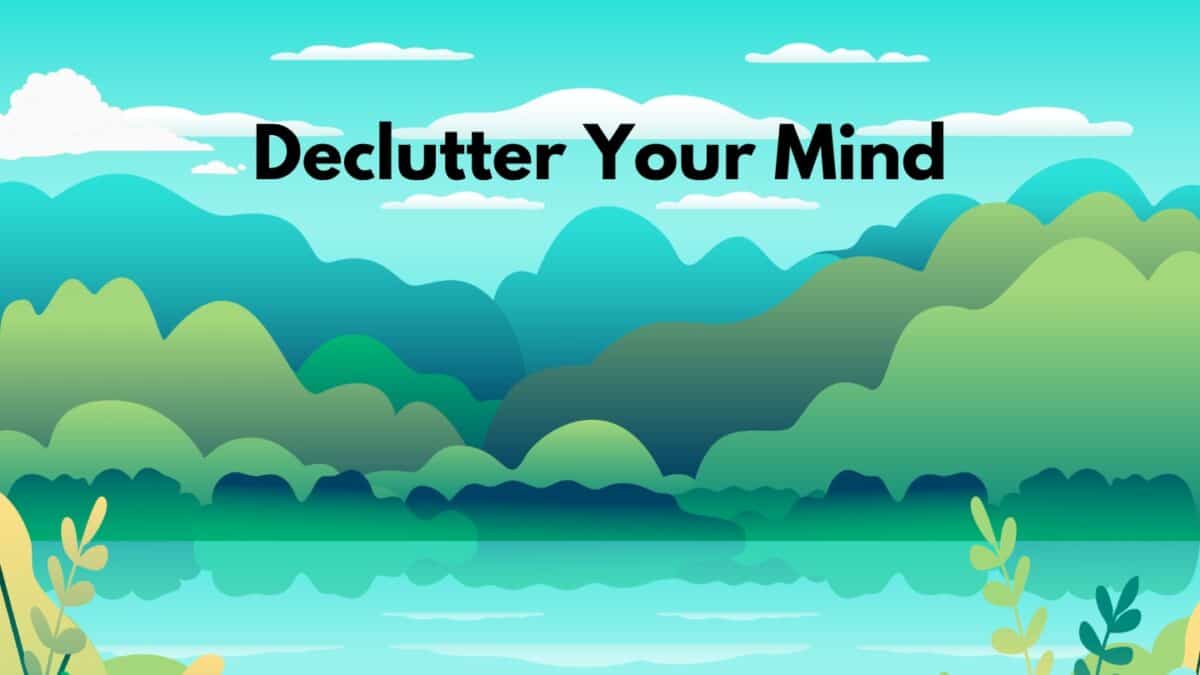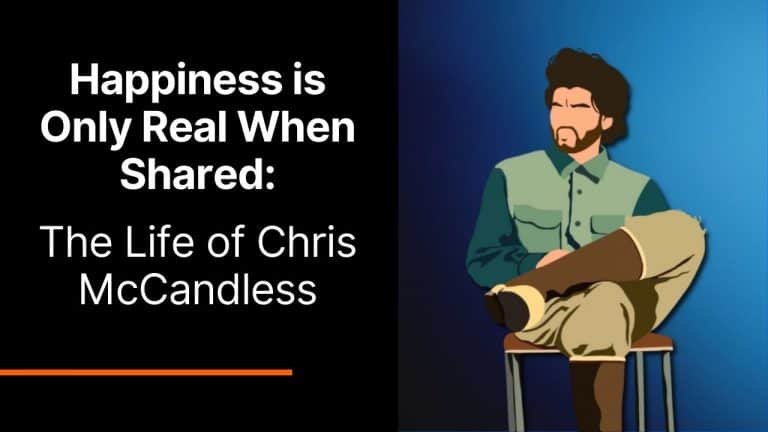Declutter Your Mind: Real Strategies to Find Your Peace
Feel like your brain is a cluttered attic full of nothing but racing thoughts and what if scenarios?
Well… let’s fix that.
You can efficiently declutter your mind to make space for peace, productivity, and progress.
And, in this article, we will:
- Acknowledge the reality of mental clutter and how it impacts your life.
- Walk you through various techniques to wipe that will place you back in control.
- Discuss how to integrate these decluttering methods into your daily routines.
- And encourage talk about why you need to forge your own personalized path to peace.
So, let’s get to it!

To Declutter Your Mind, You Must First Acknowledge The Clutter
Without first acknowledgement, there can be no decluttering.
Life is full of emotions, responsibilities, thoughts, and memories that can pile up in our minds.
Getting through this endless maze of thoughts can be a tiring. It drains us of our energy and productivity.
But to have a decluttered mind and find peace, we must acknowledge our cluttered mental state.
What Does Mental Clutter Look Like?
- Persistent negative self-talk that capsizes self-esteem and keeps you anchored in the harbor of self-doubt.
- Unhealthy obsession(s) with the past or future, keeping you from living in the full potential of the present moment.
- A never ending to-do list that makes you feel like a hamster forever running in a wheel. You’re busy, but not making any significant progress.
The Impact of Mental Clutter
Mental clutter can create a fog of confusion and fear, stranding us amidst our uncertainty.
Recognizing the presence and impact of this clutter can be our guiding light towards achieving peace of mind.
Here are some examples of mental clutter in different areas of our lives:
- Diminished Productivity: Overflowing ‘to-do-items’ in our minds can inhibit our focus and derail our productivity.
- Mental Health: High levels of mental clutter can create stress, anxiety, and depression which cripple our mental well-being.
- Physical Health: Persistent stress and anxiety can lead to physical health challenges like chronic fatigue, insomnia, obesity, and cardiovascular disease.
How to Declutter Your Mind
The path to peace involves making space in our minds so calmness can exist.
Not everything I mentioned will work for everyone. What’s important is you keep trying different methods until you discover what works for you.
Here are a few things you can try:
Meditation Techniques
Meditation is a proven method to free your mind and reduce stress.
Someone might have told you or recommended it to you before, but have you truly given it a shot? I know it’s easy to shrug it off because I sure did for years.
Two common techniques include mindfulness meditation and transcendental meditation.
With mindfulness meditation, you stay focused on your senses and surroundings. And with transcendental meditation, you repeat something or a mantra to stay focused.
Practicing either or meditation regularly can help enhance your self-awareness and diminish scattered thoughts.
Mindfulness Exercises
Mindfulness exercises are activities that keep your whole body and mind engaged and focused.
Stretching, Tai Chi, breathing exercises, and even simple walking can do this. The key is to be fully present in your activity, leaving no room in your mind for cluttering thoughts.
Writing as a Mental Cleanup Exercise
Writing down your thoughts is another effective way of taking the abstract clutter in your mind and putting it in a tangible form.
Journaling, writing letters, or even jotting down stray thoughts can give you a better understanding of your mental mess.
That way, it’s easier to sort, analyze, and eventually discard unnecessary thoughts.
Organizing Thoughts
Just as a messy room can be distracting. Muddled thoughts can be detrimental to your peace of mind.
You can organize your thoughts can in several ways.
- Using a thought record-journal to challenge negative or unhelpful thoughts
- Creating mind maps to better understand your thought patterns
- Categorizing your thoughts into urgencies and assigning tasks for each
Remember, the goal is not to empty your mind completely, but to make sufficient room for more productive and peaceful thoughts.
Mix and match these methods or change them to suit your unique needs.
Incorporating These Methods Into Your Daily Life
Now that we’ve explored a few methods to declutter the mind, making them a part of your daily routine is next.
Here’s how you can integrate these methods into your daily life:
Start Small
Trying to incorporate more than one change at once can be overwhelming.
Starting small, with just one change or method, is a more manageable approach. For example, you could begin with a five-minute meditation session each day and increase the duration as you get comfortable.
Designate a Daily Time
Consistency matters when incorporating these techniques into your daily routine.
A good practice is to designate a specific time of day. Whether that’s first thing in the morning or an hour before bed, make it solely dedicated to your mental decluttering practices.
Identify Potential Challenges
Identifying barriers might stop you from changing or using these methods consistently is next.
- Are you unable to make time because of work?
- Does the noise in your home make practicing mindfulness challenging?
Identifying these hurdles is the first step towards finding solutions.
Problem-Solving and Adaptation
With every identified challenge comes an opportunity for problem-solving.
Adapt the methods to suit your lifestyle. If finding quiet time at home is difficult, consider investing in a pair of noise-canceling headphones.
If your day’s too packed for a dedicated mindfulness exercise, consider mindful walking while on lunch or when taking a break.
Persisting with these practices may not be easy. But establishing any new habit isn’t. It takes patience and consistent practice.
These techniques can bring a refreshing change to your daily routine and lead to a clutter-free mind and personal peace.
Your Personal Path to Peace
Decluttering the mind is a personal journey, unique to each one of us.
The methods discussed earlier are not a one-size-fits-all solution, but recommendations you can use to adapt or fit you.
Here are my closing suggestions on decluttering your mind.
Experiment and Evolve
What works well for your best friend might not work well for you. And that’s okay.
Everyone is different, and so are our minds. Experiment with different techniques, evolve them to suit you, and don’t be afraid of trial and error.
Test and find out. Especially for changing your mindset and thought patterns.
Craft Your Unique Path
Create routines that combine various methods that work for you.
The steps to your path might change from meditation to mindful walking, from journaling today to a thought record tomorrow, and so on.
Reflect Regularly
Pause and reflect on how your current practice-routine is affecting your peace of mind. Are you feeling lighter, calmer, more in control?
If not, it might be time to switch things up again.
Don’t Rush
You are decluttering your mind to find peace. It’s a marathon my friend.
Not a race.
Mental decluttering is personal and an intricate process. You need to give yourself time, patience, and self-compassion. Don’t rush it.
For this journey is your own.
Embrace not just the destination of peace, but also the path you take to reach it. Let it be a journey where you discover not just peace, but also more about yourself.
And finally, everything I’ve mentioned is just a guide. It’s ultimately you who decides your path towards a decluttered mind.
Conclusion – Decluttering Your Mind
In this article about decluttering your mind, we’ve armed ourselves with some valuable insights.
- Recognizing the presence of mental clutter is the first step toward clearing it.
- Reviewed strategies, including but not limited to meditation, mindful exercises, writing, and how organizing thoughts can help declutter your mind.
- How integrating these habits into your daily life can prove effective in maintaining a clear, more relaxed mindset.
- Talked about how everyone’s individual path to peace is unique. So, it’s crucial to customize our approach to one that best resonates with your personal needs and circumstances.
- And finally, we touched on how progress in mental decluttering shouldn’t be rushed. It should be patiently nurtured, always keeping hope and determination in our hearts.
So give my suggestions a try. Go and find your peace.
Cultivate patience, resilience, and gentleness towards yourself. That way, you can gradually clear the mental clutter and pave the way to inner peace and tranquility.
And remember, your journey towards a decluttered mind is as significant as the destination itself. Embrace the self-discovery, introspection, and personal growth.
Frequently Asked Questions About
Decluttering Your Mind
Why is decluttering your mind important?
Decluttering the mind is vital because it aids in reducing stress and improving focus. By cleaning out mental clutter, we allow our mind to be more effective, resulting in better decision-making and enhanced creativity.
What are some common obstacles one might face while trying to declutter their mind?
Common obstacles in decluttering the mind can include a lack of time, distractions, firmness in established patterns, or difficulty in sitting with discomfort brought up during the process. Overcoming these challenges requires patience, commitment, and sometimes guidance from a counselor or therapist.
How long does it take to declutter a mind?
The time it takes to declutter the mind varies greatly based on the individual and the nature of their mental clutter. For some, noticeable changes can be felt within a few weeks of consistent practice. Others may take several months or more before seeing substantial results.
Can these methods be adjusted for kids and teens?
Absolutely, mental decluttering techniques can indeed be adapted to suit the needs of children and teenagers. For instance, meditation can take the form of mindful play or movements, while the write-down technique can be modified into a fun journaling activity.
What are some signs that your mind is decluttered?
Signs of a decluttered mind include increased focus, better decision-making, heightened creativity, and a general sense of calmness. Additionally, you might find it easier to let go of negative thoughts and handle stress more effectively.
What should be done if none of these declutter methods work?
If none of these methods work for you, it could be beneficial to speak to a professional such as a counselor or therapist who can provide personalized strategies based on your situation. It’s also essential to remember that mental decluttering is a process that can take time, so consistency and patience are key.






